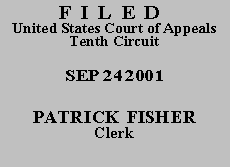

| PAUL H. GIFFORD,
Petitioner-Appellant, v. VANCE EVERETT, in his official capacity as Warden, Wyoming Department of Corrections State Penitentiary; WYOMING ATTORNEY GENERAL, Respondents-Appellees. |
|
Petitioner Paul H. Gifford appeals the district court's order dismissing as untimely his petition for a writ of habeas corpus, brought pursuant to 28 U.S.C. § 2254. Because petitioner has not made a substantial showing that the district court's procedural ruling is debatable, we deny his application for a certificate of appealability and dismiss the appeal.
Petitioner is currently incarcerated in the custody of the Wyoming Department of Corrections, after pleading guilty to aggravated kidnaping, first degree sexual assault, aggravated assault, felony stalking, and felony restraint. Because he did not file a direct appeal, petitioner's conviction became final in February 1994.
On April 24, 1996, Congress enacted the Antiterrorism and Effective Death Penalty Act of 1996 (AEDPA), which substantially amended the process of applying for habeas relief. AEDPA imposed a one-year limitation on a prisoner's right to apply for habeas relief, running from the date the prisoner's conviction became final. See 28 U.S.C. § 2244(d)(1). For state prisoners such as petitioner whose convictions became final before AEDPA's enactment, we recognized a one-year grace period within which they were required to file their habeas petitions. Hoggro v. Boone, 150 F.3d 1223, 1225-26 (10th Cir. 1998). This one-year period is subject to both statutory and equitable tolling. See 28 U.S.C. § 2244(d)(2); Miller v. Marr, 141 F.3d 976, 978 (10th Cir. 1998). Here, unless the limitations period was tolled for some reason, petitioner was required to file his habeas petition before April 24, 1997.
On April 23, 1997, petitioner filed a motion in the Wyoming state court to withdraw his guilty plea and/or for post-conviction relief. The state district court denied the motion on June 11, 1997, and the Wyoming Supreme Court affirmed the denial on July 8, 1997. Petitioner filed his § 2254 habeas petition in the federal district court on March 3, 1998. On December 1, 2000, the district court dismissed the petition as untimely, finding that petitioner did not demonstrate circumstances to justify equitably tolling the limitations period. Petitioner argues that the district court erred in dismissing the petition as untimely.
Before we may consider his appeal, petitioner must obtain a certificate of appealability by making a substantial showing of the denial of a constitutional right. 28 U.S.C. § 2253(c). Because the district court dismissed his habeas petition on a procedural ground, petitioner must show both "that jurists of reason would find it debatable whether the district court was correct in its procedural ruling," and "that jurists of reason would find it debatable whether the petition states a valid claim of the denial of a constitutional right." Slack v. McDaniel, 529 U.S. 473, 484 (2000). Each of these steps is "part of a threshold inquiry" that must be satisfied before the court of appeals may hear the appeal. Id. at 485.
We conclude petitioner has not made the requisite showing. Section 2244(d)(2) tolls the one-year limitations period for "[t]he time during which a properly filed application for State post-conviction or other collateral review . . . is pending." Because petitioner filed his state post-conviction motion on the day the limitations period was to expire, he was required to file his federal petition on July 8, 1997, when the Wyoming Supreme Court issued its decision affirming the denial of post-conviction relief. His March 3, 1998 habeas petition was well outside this period.
Equitable tolling is appropriate "in rare and exceptional circumstances," Gibson v. Klinger, 232 F.3d 799, 808 (10th Cir. 2000) (quotation omitted), such as when a prisoner is actually innocent, when uncontrollable circumstances prevent the prisoner from timely filing, or when the prisoner actively pursued judicial remedies but filed a defective pleading during the statutory period, id. Simple excusable neglect is not sufficient. Id. Moreover, petitioner must show that he diligently pursued his federal habeas claims. Marr, 141 F.3d at 978.
The district court properly concluded that petitioner had not demonstrated cause justifying equitable tolling. Petitioner argues that he was prevented from timely filing his petition because the prison was on lockdown from June 26, 1997 to January 1998, thereby curtailing his access to the library or to a legal assistant, and that he had a back injury that prevented him from pursuing his federal remedy. Petitioner has not shown how these circumstances prevented him from timely filing his habeas petition, however, as his federal petition simply repeated verbatim the grounds and legal arguments contained in his state post-conviction motion. Further, petitioner has not demonstrated that he diligently pursued his federal claims as he does not explain why he waited more than three years after his conviction became final before filing the state post-conviction proceeding.
Because petitioner has not made the threshold showing that jurists of reason would find it debatable whether the district court abused its discretion in denying his request for equitable tolling, we need not address whether he made a substantial showing of the denial of a constitutional right. Slack, 529 U.S. at 485.
Petitioner's application for a certificate of appealability is DENIED, and his appeal is DISMISSED. The mandate shall issue forthwith.
Entered for the Court
Circuit Judge
*. This order and judgment is not binding precedent, except under the doctrines of law of the case, res judicata, and collateral estoppel. The court generally disfavors the citation of orders and judgments; nevertheless, an order and judgment may be cited under the terms and conditions of 10th Cir. R. 36.3.